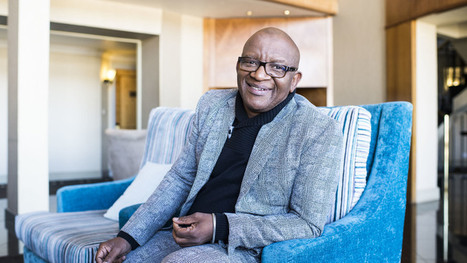Lebohang Morake also known as Lebo M is of the musical greatest to come out of South Africa’s Soweto alongside other greats like Jabu Khanyile, Jonas Gwangwa, and Letta Mbulu. Like them, Lebo M fell in love with the Soweto apartheid sound that later influenced his work and his distinctive sound to become a pop-culture icon.
You guessed it. The name Lebo M sounds familiar. That’s because, he’s the man who belts out ‘Nants ingonyama bagithi baba’ at the beginning of the Lion King’s ‘Circle of Life’ song.
He is globally known as a Grammy Award winning film composer and songwriter for the acclaimed 25-year-old Lion King film.
But Lebo, didn’t expect the historic one-liner to be such a hit in pop-culture for decades to come and neither did he think it’ll be the start of life in Hollywood for him.
Lebo’s colourful musical life started when one senior musician asked him to be a backup singer for a house band at the famous Club Pelican in South Africa’s Soweto township.
Club Pelican: The place to be
Club Pelican is a bar and nightclub that has always had the greatest music. In the 1970s it had the greatest parties happened. If you were ever performing at Club Pelican, you had to be good because high standards had been set and you will need to top it.
“It was the only nightclub [in the 1970s] that had an in-house band of the best musicians,” he says.
He describes it as very small. “It was the intimacy of the space that made it all so special. For every musician throughout the country, if you haven’t played at the Pelican, you haven’t graduated to be considered a professional musician.”
“Even whites that were not allowed in the townships, would party at the Pelican because that’s where you would have the greatest singers, a mix of RnB and all kinds of entertainment and DJs,” he added.
At the age of 14, Lebo achieved quite a feat; performing every night at the Pelican.
Young and grooving in the 70’s
Lebo firmly believed that he was going to be an RnB superstar.
With lifetime inspirations such as Lady Blacksmith Mambazo, and his all time hero, the smooth and charming Marvin Gaye, singing at the Pelican, growing in experience, was already a dream coming true.
Despite the horrors of the Apartheid regime lurking outside the walls of the Pelican, he was grooving through the 70’s comfortably.
He even donned the hip symbolic outfit for the black person of that decade – swinging bell bottoms, high heels and the proud bouncy afro.
It was simply no better time to be cool in the groove doing what he loved most, music and earning a living while at it.
Soon though, those harsh realities would eventually meet Lebo.
Soweto was the centre for underground groups and anti-apartheid activism. Lebo wasn’t part of it yet, but revolutionary activity surrounded him.
“What I didn’t know was that the Pelican was more than a partying nightclub thing. I remember very specifically friends of mine would come with envelopes and put them under the stage,” and some would even ask him to hold a few of these.
“Turns out they were political pamphlets,” he recalls.
A change is coming
Apartheid is one of Africa history’s darkest times and for South Africa, a long lasting oppressive socio-political system that maltreated the black man.
By the time Lebo had sang the best tunes and bopped to the best rhythms in Pelican, activists against apartheid had also made nightclubs their home to meet and discuss the future of their beloved country.
What happened in the Pelican for one, speaks to the truth that music can act as a political agency for social change.
Though for Lebo, his love for music called out louder to him. So much so, that after hearing a rumour about a better club than the Pelican, existing in Lesotho, he chased after the rumour to find the truth with his friends.
However, he didn’t know then that Lesotho was a different country altogether and leaving South Africa without identification papers would become a difficult problem if he wanted to return home during Apartheid.
This trip though would indeed change the course of his life forever.
Living in exile
In Lesotho, life was sweeter than life in Soweto.
Lebo teamed up with his friends and hung out in the swankiest of hotels and restaurants making, singing music and mingling with diplomats and businesspeople.
Eventually Lebo met the Lesotho Ambassador to the United States. His dream of becoming a musical, lyrical sensation like Marvin Gaye was in sight but not all that glittered was gold.
Living in America, he says was traumatic at the time because the land of the free, the land of opportunity that the USA claimed to be, for African-Americans, was the stark opposite.
“Apartheid is horrible but at least we knew the system hated us and it’s better to know where you stand other than live under the myth of freedom in a democracy.”
“Before leaving South Africa, and Africa, America was heaven. One never knew that there’s anybody poor in America, black, white or anything and when you then live in African-American environment, you realise that your dream heaven is actually hell for other people.”
Lebo’s life comes full circle
He attended Washington D.C’s prestigious Duke Ellington School of Arts upon arriving in the America. He ministered in an African-American church choir and had even been abandoned by a producer in South Central Los Angeles (LA). While begging for money to survive, he also accommodated himself on LA’s streets. Then the miraculous occurred though you could also call it fate. While at a studio working as a studio runner, he meets Hans Zimmer and with that came a new chapter.
“He was about to do a movie called ‘Power of One’ and someone said to Hans, “Hey, you must try this kid, the one that just made coffee for us,” and I went to Hans’ studio the next day.”
“I figured it’s ok and I’m probably just going to go there and translate language but I ended up co-writing and co-producing the soundtrack to the ‘Power of One’,” Lebo shares.
Disney’s Lion King
After working with Hans Zimmer, Lebo had entered the film genre; he was now a film composer.
Aware of Lebo’s talent, Hans Zimmer recommended Lebo to Elton John and Tim Rice who were put in charge of creating a soundtrack for a new movie, Disney’s The Lion King.
“I don’t think anyone knew that this film was going to be a big movie,” he remarks.
In the studio, working on the first song everyone has heard at the beginning of the film, Lebo says after creating the ‘ingonyama’ chant, just when he was about to leave, he was asked to turn the mic back on, play the track again and then he belts out the famed ‘Nants ingonyama bagithi baba’ line.
“It was one take, then I left. I was not aware that that one take would be history.”
Describing what the film means to him now he says, “I identified with the characters in the script. It was not like cartoons. The character of Simba was me, the character of Mufasa was Nelson Mandela, the character of Scar represented the Apartheid regime. The story just came in at the right time.”
I’m still loving it
Once the world heard Lebo’s magical music, he had been catapulted into a new dimension of fame and wonder of what was next for him to achieve. He admits that the Lion King reality that brought follow up interviews, invitations to exclusive events, the celebrity spotlight, all snuck up on him but it never affected him negatively.
Lebo M loves his life the same way he loves the tempo of music, no matter the speed. He was never doubtful of where he was heading. For him, it has always been the adrenaline and excitement that has helped him keep his eye on the prize – to live a life in music forever, and “I’m still loving it.”














